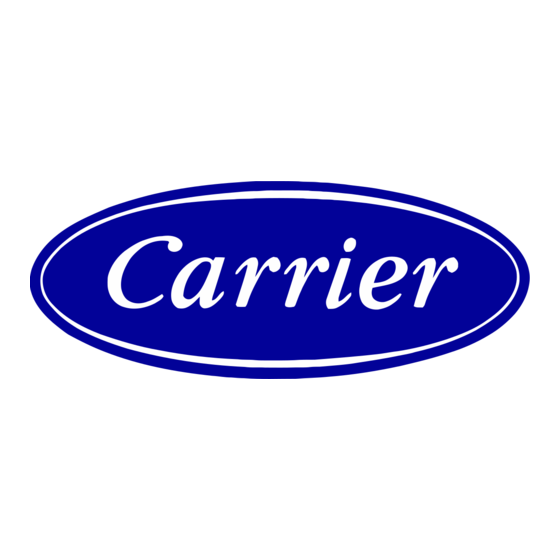Table of Contents
Advertisement
Quick Links
Visit www.carrier.com
A Guide To Operating and Maintaining Your
Single-Package Electric Heat Pump Unit
NOTE TO INSTALLER
This manual should be left with the equipment owner.
Do not store or use gasoline or other flammable vapors and
liquids in the vicinity of this or any other appliance. Failure to
follow this warning could result in fire, serious injury, or
death.
Do not use this unit if any part has been under water.
Immediately call a qualified service technician to inspect the
unit and to replace any part of the control system which has
been under water. Failure to follow this warning could result
in electrical shock, fire, serious injury, or death.
Before performing recommended maintenance, be sure the
main power switch to unit is turned off. Electric shock could
cause serious injury or death.
TO START UNIT
1. Turn on the electrical power supply to unit.
2. Select temperature and set SYSTEM switch or MODE control
to desired mode.
TO SHUT UNIT OFF
If unit is being shut down because of a malfunction, call your
dealer as soon as possible.
1. Set system SWITCH or MODE control to OFF.
2. Turn off the electrical power supply to unit.
OPERATING YOUR HEAT PUMP UNIT
The operation of your heat pump system is controlled by the
indoor thermostat. You simply adjust the thermostat and it
maintains the indoor temperature at the level you select. Most
thermostats for heat pump systems have 3 controls: a temperature
control selector, a FAN control, and a SYSTEM or MODE control.
Refer to your thermostat owner's manual for more information.
Step 1—Cooling Mode
With the SYSTEM or MODE control set to COOL, your heat
pump will run in cooling mode until the indoor temperature is
lowered to the level you have selected. On extremely hot days,
your heat pump will run for longer periods at a time and have
shorter "off" periods than on moderate days.
Step 2—Heating Mode
With the SYSTEM or MODE control of your indoor thermostat set
to HEAT, your heat pump will run in heating mode until room
temperature is raised to the level you have selected. Of course,
your heat pump will have to operate for longer periods to maintain
a comfortable environment on cooler days and nights than on
moderate ones.
Manufacturer reserves the right to discontinue, or change at any time, specifications or designs without notice and without incurring obligations.
Book 1 4
PC 101
Catalog No. 565-070
Tab 5a 5a
Single-Package Electric Heat Pump Unit
with Puron® (R-410A) Refrigerant
Step 3—Supplemental Heat
Your heat pump is your primary heating source. Your system may
also be equipped with a supplemental heating source such as
electrical heat. On cold days and nights, your system will auto-
matically turn on the supplemental heat in order to maintain the
level of comfort you have selected.
When your heat pump needs additional heat to keep you comfort-
able, your Carrier electronic thermostat will turn on the supple-
mental heat (if equipped) and display the "AUX HT" message.
Step 4—Defrost Mode
When your heat pump is providing heat to your home or office and
the outdoor temperature drops below 45 °F, moisture may begin to
freeze on the surface of the coil. If allowed to build up, this ice
would impede airflow across the coil and reduce the amount of
heat absorbed from the outside air. So, to maintain energy-efficient
operation, your heat pump has an automatic defrost mode.
The defrost mode starts at a preset time interval of 30 minutes,
although, it may be reset to 60, 90 or 120 minutes. Defrost will
start at the preset time only if the ice is sufficient to interfere with
normal heating operation.
After the ice is melted from the coil, or after a maximum of 10
minutes in defrost mode, the unit automatically switches back to
normal heating operation.
Do not be alarmed if steam or fog appears at the outdoor unit
during defrost mode. Water vapor from the melting ice may
condense into a mist in the cold outside air.
During certain weather conditions such as heavy snow and
freezing rain it is not uncommon for ice to build up on the unit
grille. This is normal for these weather conditions. Do not attempt
Printed in U.S.A.
Form OM50-29
Fig. 1—Unit 50JZ
Pg 1
8-00
50JZ
Replaces: New
Advertisement
Table of Contents

Subscribe to Our Youtube Channel
Summary of Contents for Carrier 50JZ Series
- Page 1 When your heat pump needs additional heat to keep you comfort- 1. Set system SWITCH or MODE control to OFF. able, your Carrier electronic thermostat will turn on the supple- mental heat (if equipped) and display the "AUX HT" message.
- Page 2 to remove the ice from the unit grille. This condition will not affect the proper function of the unit and will clear within a few days. Step 5—Emergency Heat Mode This allows your supplemental heating source to keep your home or office warm until your heat pump can be serviced.
- Page 3 REFRIGERANT CIRCUIT — The refrigerant circuit is difficult 10. Operational check of the unit to determine working condi- to check for leaks without the proper equipment; therefore, if tions. Repair or adjustment should be made at this time. inadequate cooling is suspected, contact your local dealer for Your servicing dealer may offer an economical service contract service.
- Page 4 Copyright 2000 CARRIER Corp. • 7310 W. Morris St. • Indianapolis, IN 46231 om5029 Manufacturer reserves the right to discontinue, or change at any time, specifications or designs without notice and without incurring obligations. Book 1 4 PC 101 Catalog No. 565-070 Printed in U.S.A.









Need help?
Do you have a question about the 50JZ Series and is the answer not in the manual?
Questions and answers